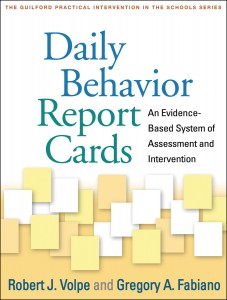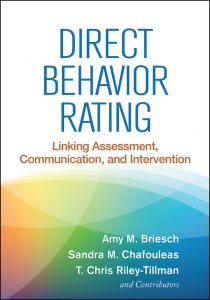Briesch, A. M., Chafouleas, S. M., Chaffee, R. K. (in press). State-level priorities in school-based behavior screening protocols and initiatives. School Mental Health.
Chaffee, R. K., Briesch, A. M., Johnson, A., & Volpe, R. J. (2017). A meta-analysis of class-wide interventions for supporting student behavior. School Psychology Review, 46, 149-164. doi: 10.17105/SPR-2017-0015.V46-2
Daniels, B., Volpe, R.J., Fabiano, G. A., & Briesch, A. M. (2017). Classification accuracy and acceptability of the Integrated Screening and Intervention System Teacher Rating Form. School Psychology Quarterly, 32(2), 212-225. doi: 10.1037/spq0000147
Dubois, M. R., Volpe, R. J., Burns, M. K., & Hoffman, J. A. (2016). Parent-administered computer-assisted tutoring targeting letter-sound knowledge: Evaluation via multiple-baseline across three preschool students. Journal of School Psychology, 59, 39-53. doi: 10.1016/j.jsp.2016.09.004
Cook, C. R., Volpe, R. J., & Gresham, F. M. (in press). Technical adequacy, classification accuracy, and social validity of the Student Externalizing Behavior Screener. Assessment for Effective Intervention.
Ogg, J. A., Volpe, R. J., & Rogers, M. A. (2016). Understanding the relationship between inattention and early literacy trajectories in kindergarten. School Psychology Quarterly, 31(4), 565-582. doi: 10.1037/spq0000130
Volpe, R. J., & Briesch, A. M. (2016). Dependability of two scaling approaches to direct behavior rating multi-item scales assessing disruptive classroom behavior. School Psychology Review, 45(1), 39-52. doi: 10.17105/SPR45-1.39-52
Briesch, A. M., & Briesch, J. M. (2016). A meta-analysis of behavioral self-management interventions in single-case research. School Psychology Review, 45(1), 3-18. doi:10.17105/SPR45-1.3-18
Casale, G., Hennemann, T., Volpe, R. J., & Grosche, M. (2015). Generalisierbarkeit und zuverlässigkeit von direkten verhaltensbeurteilungen des lern- und arbeitsverhaltens in einer inklusiven grundschulklasse. [Generalizability and dependability of direct behavior ratings of academically engaged behavior in an inclusive classroom setting.], Empirische Sonderpädagogik, 3, 258-268.
Volpe, R. J., & Briesch, A. M. (2015). Multi-item direct behavior ratings: Dependability of two levels of assessment specificity. School Psychology Quarterly, 30, 431-442.
Briesch, A. M., Hemphill, E. M., Volpe, R. J., & Daniels, B. (2015). An evaluation of observational methods for measuring response to classwide intervention. School Psychology Quarterly, 30(1), 37-49. doi: 10.1037/spq0000065
Mulé, C. M., Volpe, R. J., Fefer, S., Leslie, L. K., & Luiselli, J. (2015). Comparative effectiveness of two sight-word reading interventions for a student with Autism Spectrum Disorder. Journal of Behavioral Education, 24(3), 304-316. doi: 10.1007/s10864-015-9220-5
Briesch, A. M., Briesch, J. M., & Chafouleas, S. M. (2015). Investigating the usability of classroom management strategies among elementary school teachers. Journal of Positive Behavior Interventions, 17, 5-14. doi: 10.1177/1098300714531827
Briesch, A. M., Briesch, J. M., & Mahoney, C. (2014). Reported use and acceptability of self-management interventions to target behavioral outcomes. Contemporary School Psychology, 18, 222-231. doi: 10.1007/s40688-014-0016-8
Daniels, B., Volpe, R. J., Briesch, A. M., & Fabiano, G. A. (2014). Development of a problem-focused behavioral screener linked to evidence-based intervention. School Psychology Quarterly, 29, 438-451.
Briesch, A. M., Volpe, R. J., & Ferguson, T. D. (2014). The influence of student characteristics on the dependability of observation data. School Psychology Quarterly, 29, 171-181.
Volpe, R. J. & Suldo, S. M. (2014). Theoretical frameworks in school psychological intervention research: Interdisciplinary perspectives and future directions. School Psychology Review, 43, 115-118.
DuBois, M. R., Volpe, R. J. (2014). A randomized trial of a computer-assisted tutoring program targeting letter sound expression via incremental rehearsal. School Psychology Review, 43, 210-221.
Grosche, M. & Volpe, R. J. (2013). Response-to-intervention (RTI) as a model to facilitate inclusion for students with learning and behaviour problems. European Journal of Special Needs Education, 28, 254-269.
Briesch, A. M., Ferguson, T. D., Volpe, R. J., & Briesch, J. M. (2013). Examining teachers’ perceptions of social-emotional and behavioral referral concerns. Remedial and Special Education, 34, 249-256.
Ferguson, T. D., Briesch, A. M., Volpe, R. J., & Daniels, B. (2012). The influence of observation length on the dependability of data. School Psychology Quarterly, 27, 187-197.
Volpe, R. J., & Briesch, A. M. (2012). Generalizability and dependability of single item and multiple item direct behavior rating scales for engagement and disruptive behavior. School Psychology Review, 41, 246-261.
Volpe, R. J., Young, G. Piana, M. E., & Zaslofsky, A. F. (2012). Integrating class-wide early literacy intervention and behavioral supports: A pilot investigation. Journal of Positive Behavior Interventions, 14, 56-64.
Volpe, R. J., Briesch, A., & Gadow, K. D. (2011). The efficiency of behavior rating scales to assess disruptive classroom behavior: Applying generalizability theory to streamline assessment. Journal of School Psychology, 49, 131-155.
Volpe, R. J., Burns, M. K., DuBois, M. & Zaslofsky, A. F. (2011). Computer-assisted tutoring: Teaching letter sounds to kindergarten students using incremental rehearsal. Psychology in the Schools, 48, 332-342.
Volpe, R. J., Mulé, C. M. Briesch, A. M., Joseph, L. M., Burns, M. K. (2011). A comparison of two flashcard drill methods targeting word recognition. Journal of Behavioral Education, 20, 217-237.



